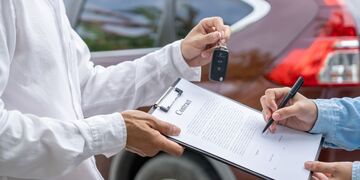Documentation is an important part of selling a car, but it can be one of the most confusing. What documents are necessary? Who’s responsible for certain paperwork? Can you be fined for not giving a buyer a particular document? In this guide, we run through the required documents for selling a car in Australia to ensure your next car sale is a smooth process.
Documentation checklist
If you choose to sell your car with AutoFlip, our support team will help facilitate the relevant paperwork, as required by your location and the successful buyer of your vehicle. This will be sent to you for completion and signing - easy!
However, the following documents need to be considered if you’re thinking of taking on the responsibility and selling your car privately.
1. Vehicle registration certificate
A current vehicle registration certificate shows that the vehicle is registered and allows the buyer to drive it away after purchasing. Having your car registered may also increase its value to prospective buyers. If you have lost your registration certificate, you can apply for a paper replacement online in most states.
2. Roadworthy safety certificate
A roadworthy certificate (RWC) is required in most Australian states in order to register a vehicle over a certain age. The RWC proves the vehicle meets minimum safety standards in terms of braking, electrics and operation. You can obtain a RWC from a licensed automotive repair shop. Of course, it may mean you need to spend some money on repairs to qualify for a RWC. This isn’t a requirement when selling with AutoFlip as you’re selling to a licensed dealer rather than a member of the public.
3. Service records and vehicle history
Many genuine buyers will request to look at your car’s service book to see if maintenance has been performed on time. You may also wish to have a copy of a vehicle history report for the prospective buyer to look at, although they may have already completed one of these checks online when researching your vehicle.
4. Proof of ownership
Being able to clearly prove that you are the registered owner of the vehicle is reassuring to the prospective buyer that you are a genuine seller. While the registration certificate can help with this, having original purchase documents or a bill of sale acts as extra proof that you own the vehicle.
5. Payout letter (if applicable)
Many vehicles today are purchased using finance or leasing agreements. If that is the case with your vehicle, ensure you are transparent in providing a payout letter from the financier, that clearly outlines the balance to be paid on the vehicle’s loan. AutoFlip can assist the successful buyer of your car and your finance company to help facilitate a smooth sales process.
6. Warranty documents (if applicable)
If your vehicle is still under warranty, make sure you include any paperwork that explains how the warranty can be transferred to any subsequent owners. Also include documentation of any warranty claims that have been made during your ownership.
7. Personal identification
As a seller, it’s important to have your personal information on hand to verify you are who you say you are and that the purchase is legitimate. As the seller, you may also want to see identification from potential buyers, particularly if they plan on taking your car for a test drive. Verifying personal information is the first step to ensuring transparency during the sale, helping to protect you from car sales scams.
8. Police Slip (if applicable)
In Victoria, certain buyers may require you to provide a Police Slip, which lists the details of your car and the date and time the vehicle was exchanged. This ensures the future owner is not responsible for any fines or tickets received following the trade, and vice versa.
9. Tax Declaration (if applicable)
You may be required to provide a Tax Declaration that states your vehicle is not registered for GST as a private owner, while on the other hand, if your vehicle belongs to a company you would need to provide a tax invoice.
Special considerations for interstate sales
When selling your car to an interstate buyer, it’s important to thoroughly verify the buyer’s identity. It’s also a good idea to request full payment for the vehicle before you release it from your hands.
It’s best to discuss with the buyer the best practices for insurance and vehicle registration transfers, as laws differ from state to state. However, it’s important to know that if the vehicle is being driven interstate, it will require Compulsory Third Party (CTP) insurance by law.
Transportation may also be required for interstate purchases, although this is usually organised by the buyer.
You should also check on any relevant laws, fees or forms in your state or territory that are required when selling your car interstate.
Ensure your car sale is smooth with the right documents
Having all the necessary documents for selling a car available to prospective buyers helps to legitimise both you as a seller and your vehicle. Taking the time to collate your car’s documents gives purchasers peace of mind and ensures a smooth, legal and quick sale of your vehicle.
Sound like a lot of work?
Of course, if you’d rather a simple, hassle-free car selling experience, AutoFlip’s the way to go. Simply, enter your car details and access our extensive network of dealers ready to competitively bid on your car. If you accept an offer, then sit back while we take care of the paperwork and ensure a smooth transition from you to the successful buyer.



